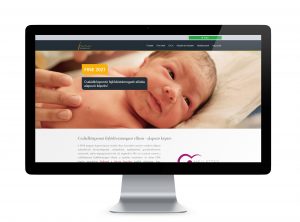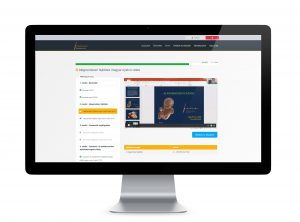A guest article by Livia Nagy
Every year more than 8,000 newborns begin their lives in premature intensive care units of different levels in Hungary. The pillars of family-centred care are absent from numerous units, one of the most significant of these being the lack of opportunities for the 24-hour presence of parents and their involvement in the care of their children.
In 2019 the Government of Hungary set family-friendly values and the implementation of family and child-friendly approaches as widely as possible to be key objectives and, in line with this, supports the introduction of family-friendly measures and regulatory environment. The government also supports the development of obstetric care in Hungary in a way that meets the needs of parents and improves the experience related to the birth of a new family member, the expansion of the family. It ensures a positive experience of giving birth and breastfeeding, supports the period after giving birth, facilitates the development of early attachment, provides the best opportunities for children for a healthy start in life, and supports family-friendly obstetric care in Hungary.
The Family-Friendly Obstetrics Program
During the year the hospitals could apply for participation in the Family-Friendly Obstetrics Programme in different phases, which provides financial support, integrated infrastructural and equipment development, and training also for improving programmes to prepare expecting mothers (CSBSZ 2019).
The objective of the call for applications is the broadest possible implementation of family-centred values in publicly-funded obstetrics and neonatology in-patient care as well as premature intensive (NICU) care, including the improvement of environmental conditions as well as the professional and methodological approaches and practice. The long-term objective of the grant is to have healthcare providers in Hungary in the fields of obstetrics, newborn and premature care who are devoted to the mother- and baby-friendly approach and the family-friendly values as much as possible. The original date for the implementation of the tender was the end of 2020, but due to the pandemic, the Government extended the date until the end of 2021.
Within preterm intensive care, support for participation in family-centred developmental training programmes, including the Family and Infant Neurodevelopmental Education (FINE) programme was a popular choice among the heads of NICUs.
The FINE programme is one of the most-widely-used training programmes worldwide for professionals who work with preterm babies in neonatal intensive care units. It is based on the establishment of evidence-based, family-friendly and baby-focused care, which includes observation, monitoring and responding to the babies’ cues, supporting parents as primary caregivers, and providing the baby with an environment appropriate to his or her brain development.
Workshops and online courses – bringing FINE into the hospitals
Due to multiple reasons, the realisation and implementation of the level 1 and level 2 FINE trainings was in jeopardy: the COVID-19 pandemic and lack of availability and shortage of neonatal nurses and doctors made it complicated to adapt the whole educational program to a 2-day ZOOM meeting learning experience.
During 2020 we had to convert the FINE training to a mixed online and ZOOM based workshop programme.

The newly designed website offers digital training modules for enrolled participants.
Inga Warren, who shares ownership of the FINE programme with the Erasmus Medical Centre in Rotterdam, has collaborated with our Association (Melletted a helyem Egyesület) to organise the trainings so that the hospitals that have applied for the training can participate in accordance with the grant proposal.
To support the ZOOM workshops, Inga Warren developed online courses and we created a website in Hungarian, which contains exactly the same information, presentations as Inga or other FINE instructors would give in a classroom environment with the help of a translator. The website content is in Hungarian but entirely created by Inga Warren. The entire FINE training programme is under strict copyright protection!

The content was set up in English and is entirely translated into Hungarian following rigid copyright guidelines.
The topics of the theoretical training can be followed in the form of modules via the website created for the training, after registration. Topics of the training include the neurodevelopment of preterm / newborn babies, observing babies, parental experience and the importance of family involvement, management of stress and pain, sleep protection, motor development of the baby and positioning, also highlighting the importance of creating a “brain-protective” environment during care, which is adapted to the sensory development of the babies and is closely related to the application of the kangaroo method and nutrition.
Following the order of the given modules and answering the questions of the given curriculum, the participants can move from chapter to chapter. After completing the modules, with the help of the ZOOM platform, the nurses and doctors learn to transfer what they have learned in theory into everyday care practice.
Please be aware that access to the website tutorial part is only available for participants who are financed by the Hungarian Government’s “Family-Centred Obstetrics Grant programme”.
About the FINE project:
FINE is a programme designed to introduce the principles and practices of newborn developmental care to healthcare professionals of all educational backgrounds, who care for preterm and otherwise high-risk newborn infants and their families. The FINE Programme is based on the principles of NIDCAP (Newborn Individualized Developmental Care and Assessment Programme) and has been endorsed by the NFI (NIDCAP Federation International) as foundations in NIDCAP education. The FINE Programme’s Directors are NIDCAP Trainers Inga Warren, Dip COT, MSc, Monique Oude Reimer, RN, and Nikk Conneman, MD. (source: https://nidcap.org/en/about-us/endorsed-by-nfi/; 24.02.2021).
About the author:
Livia Nagy is Chairwoman of the Hungarian parent organisation, Right(s) beside you Association (Melletted a helyem Egyesület)
she is a member of the EFCNI Parent Advisory Board and has as such been contributing to the European Standards of Care for Newborn Health Project. Livia is also a Founding Committee member of GLANCE.

